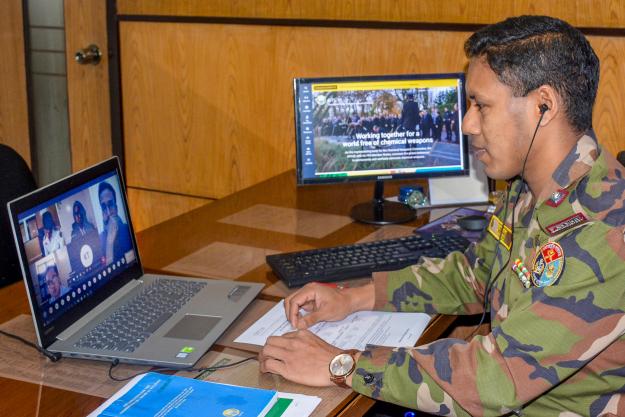
THE HAGUE, Netherlands — 25 June 2020 — The Organisation for the Prohibition of Chemical Weapons’ (OPCW) first online training course on Declarations and Inspections Obligations under Article VI of the Chemical Weapons Convention was held online from 15 to 24 June 2020 for practitioners from the South-East Asia region. Due to Covid-19, the usual face-to-face training course was transformed into an online format, including self-paced e-learning and live sessions with OPCW experts.
The OPCW’s Director of International Cooperation and Assistance Division, Ms Kayoko Gotoh, stated in her opening remarks: “The significance of the Asia region in terms of the size of the chemical industry, trade of chemicals and the pace of technological developments highlights the importance of holding this training course for Member States in Asia and in particular, South-East Asia.”
Through the first-ever exercise of its type, participants worked on a scenario exercise to prepare a declaration using the OPCW’s latest electronic declaration tool, the Electronic Declaration Information System (EDIS). Participants worked through practical exercises using the EDIS system, and were able to interact with OPCW staff who provided technical guidance, assessed participants’ knowledge, and helped develop post-training action plans.
Participants, experienced practitioners in national implementation of Article VI, gained practical experience with the EDIS system, refreshed relevant knowledge and skills, and interacted with representatives of other Member States.
Twenty-two participants completed the training and represented eight OPCW Member States: Bangladesh, Indonesia, Malaysia, Myanmar, Pakistan, Philippines, Thailand and Vietnam.
Background
As of June 2020, 73 OPCW Member States have submitted declarations for declarable facilities or activities for 2019, involving over 5,300 sites. Since its establishment, the Technical Secretariat of the OPCW has conducted more than 4,100 inspections of industrial sites to verify that the production and use of chemicals are intended solely for peaceful purposes.
As the implementing body for the Chemical Weapons Convention, the OPCW, with its 193 Member States, oversees the global endeavour to permanently eliminate chemical weapons. Since the Convention’s entry into force in 1997, it is the most successful disarmament treaty eliminating an entire class of weapons of mass destruction.
Over 97% of all chemical weapon stockpiles declared by possessor States have been destroyed under OPCW verification. For its extensive efforts in eliminating chemical weapons, the OPCW received the 2013 Nobel Peace Prize.
